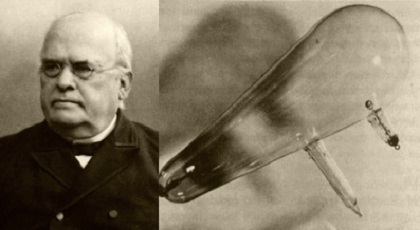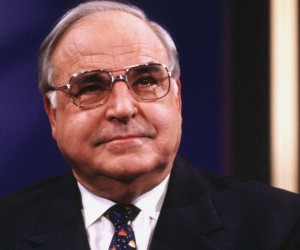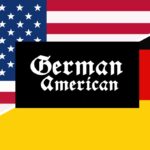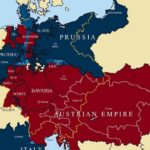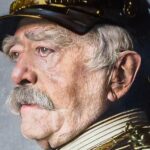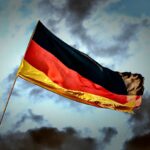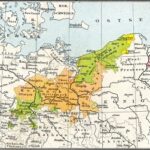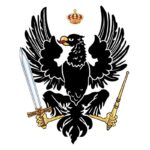November 28, 1794
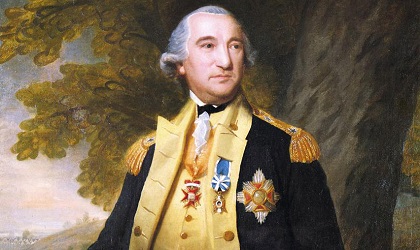 Death of Friedrich von Steuben in Remsen, New York (born in Magdeburg, Germany). Steuben was a Prussian officer who was induced by Benjamin Franklin to come to America on the side of the rebelling colonies. Arriving in 1777 he was placed in charge of the troops at Valley Forge. He retrained the forces and wrote a manual, Regulations for the Order and Discipline of the Troops of the United States. The city of Steubenville, Ohio is named for him.
Death of Friedrich von Steuben in Remsen, New York (born in Magdeburg, Germany). Steuben was a Prussian officer who was induced by Benjamin Franklin to come to America on the side of the rebelling colonies. Arriving in 1777 he was placed in charge of the troops at Valley Forge. He retrained the forces and wrote a manual, Regulations for the Order and Discipline of the Troops of the United States. The city of Steubenville, Ohio is named for him.
November 28, 1820
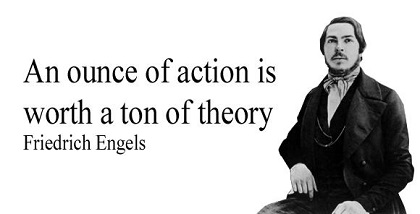 Birth of Friedrich Engels in Barmen, Germany. Engels was the son of a wealthy industrialist who owned a textile factory in Barmen and was a partner in the firm of Ermen and Engels in Manchester. Friedrich Engels worked in his father’s business as a young man but developed radical ideas early on. He was strongly influenced by the “Young Hegelians”. He began writing radical essays early on under the name of Friedrich Oswald. He had met Karl Marx in Cologne and their friendship continued through Marx’s years in Paris and London. He worked closely with Marx on Das Manifest der kommunistischen Partei (1848), and on the Neue Rheinische Zeitung. Engels completed Das Kapital after Marx’s death from the incomplete manuscript and notes. When Marx went to London, Engels took a position with Ermen and Engels in Manchester the income from which he contributed to Marx’s support. By the time of Marx’s death he was giving him 350 pounds a year and incidentals. In addition to the materials he wrote with Marx, Engels wrote a great deal under his own name and that of Friedrich Oswald.
Birth of Friedrich Engels in Barmen, Germany. Engels was the son of a wealthy industrialist who owned a textile factory in Barmen and was a partner in the firm of Ermen and Engels in Manchester. Friedrich Engels worked in his father’s business as a young man but developed radical ideas early on. He was strongly influenced by the “Young Hegelians”. He began writing radical essays early on under the name of Friedrich Oswald. He had met Karl Marx in Cologne and their friendship continued through Marx’s years in Paris and London. He worked closely with Marx on Das Manifest der kommunistischen Partei (1848), and on the Neue Rheinische Zeitung. Engels completed Das Kapital after Marx’s death from the incomplete manuscript and notes. When Marx went to London, Engels took a position with Ermen and Engels in Manchester the income from which he contributed to Marx’s support. By the time of Marx’s death he was giving him 350 pounds a year and incidentals. In addition to the materials he wrote with Marx, Engels wrote a great deal under his own name and that of Friedrich Oswald.
November 28, 1881
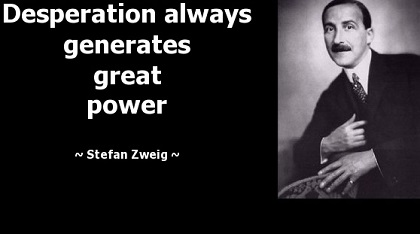 Birth of Stefan Zweig in Vienna, Austria. Stefan Zweig was a writer who worked in a variety of genres. Noted works by Zweig are, Drei Meister (1920), Der Kampf mit dem Dämon (1925), Sternstunden der Menschheit (1928) and Verwirrung der Gefühle (1925). At the rise of the Nazis he went into exile in 1934. He went first to England and then to Brazil. He committed suicide in Brazil in 1942.
Birth of Stefan Zweig in Vienna, Austria. Stefan Zweig was a writer who worked in a variety of genres. Noted works by Zweig are, Drei Meister (1920), Der Kampf mit dem Dämon (1925), Sternstunden der Menschheit (1928) and Verwirrung der Gefühle (1925). At the rise of the Nazis he went into exile in 1934. He went first to England and then to Brazil. He committed suicide in Brazil in 1942.
November 28, 1887
Birth of Ernst Röhm in Munich, Germany. Röhm was a member of the National Socialist Party (Nazi) before Hitler. He organized the SA (Sturmabteilung, storm troops; also called the Brownshirts). By 1934 Hitler began to see Röhm as a rival and began to be concerned about the power of the SA. He had Röhm shot.
November 28, 1898
Death of Conrad Ferdinand Meyer in Kilchberg, Switzerland. Meyer wrote poetry and novels. Among his works are Das Amulett, Der Heilige, Das Leiden eines Knaben, and Die Hochzeit des Mönchs.
November 28, 1912 .
Death of Otto Brahm in Berlin, Germany. Brahm, a literary critic, cofounded the theater company “Freie Bühne” in Hamburg in 1889 and in 1890 a periodical also called Freie Bühne. The theater company and the periodical were his vehicles to introduce the Naturalist movement into German theater. Freie Bühne changed its name later to Neue Deutsche Rundschau.
November 28, 1914
Death of Johann Wilhelm Hittorf in Münster, Germany. Hittorf was the first to calculate the electricity-bearing capacity of charged atoms and molecules. He was a professor of physics and chemistry at the University of Münster.
November 28, 1989
Chancellor Helmut Kohl presents a 10-point plan for German reunification to the Bundestag:
First: Right away, immediate measures arising out of the events of the last few weeks, particularly the refugee movements and the new dimensions of travel, are necessary.
The Federal Government is prepared to give immediate practical assistance where that assistance is needed now. In the humanitarian sphere and in medical provision we shall help wherever it is wanted…
Second: The Federal Government will as hitherto continue cooperation with the GDR in all spheres of direct benefit to the people on both sides . . .
Third: I have offered to extend our assistance and our cooperation comprehensively when a radical change in the political and economic system in the GDR is bindingly decided and irreversibly set in motion. “Irreversibly” means for us that the GDR national leadership should come to agreement with opposition groups on constitutional change and on a new electoral law.
We support the demand for free, equal and secret elections in the GDR with the involvement of independent parties, including non-socialist ones. The SED’s power monopoly must be removed…
Fourth: Prime Minister Modrow spoke in his government statement of a community based on treaty. We are prepared to take up this idea.
Fifth But we are also prepared to take one further decisive step, namely to develop confederative structures between the two States in Germany, with the objective of then creating a federation, that is, a national federal system in Germany. This necessarily presupposes a democratically legitimated government in the GDR. . . How a reunited Germany will finally look is something no one today knows. But that unification will come if the people in Germany want it, of that I am certain.
Sixth: The development of German internal relationships remains embedded in the overall European process and in East-West relationships. The future architecture of Germany must be fitted into the future architecture of Europe as a whole. For this the West, with its concept of a lasting and just European system of peace, has rendered yeoman service.
Seventh: The European Community’s power of attraction and influence is and remains a constant factor in overall European development. We wish to strengthen it further. The European Community is now being called on to approach the reform-oriented States of Central, Eastern and South-Eastern Europe with openness and flexibility.
We see the process of regaining German unity as a European matter. It must therefore also be seen in combination with European integration. In this sense, the European Community must keep itself open for a democratic GDR and for other democratic States of Central and South-Fastern Europe. The Community must not end at the Elbe, but must maintain openness eastward too.
Eighth: The CSCE process is and remains the core of this architecture of Europe as a whole, and must be pushed energetically forward. For this the existing CSCE forums must be taken advantage of…
Ninth: The overcoming of the splitting of Europe and the division of Germany requires far-reaching, speedy steps in disarmament and arms control. Disarmament and arms control must keep pace with political developments…
Tenth: With this comprehensive policy, we are working towards a situation of peace in Europe in which the German people can regain its unity in free self-determination. Reunification, that is, the regaining of Germany’s national unity remains the Federal Government’s political objective.
